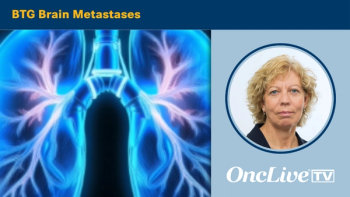
Dr. O’Shaughnessy on DESTINY-Breast02 and DESTINY-Breast03 in Metastatic HER2+ Breast Cancer

Joyce A. O’Shaughnessy, MD, discusses key data from the phase 3 DESTINY-Breast02 and DESTINY-Breast03 trials in metastatic HER2-positive breast cancer.
Joyce A. O’Shaughnessy, MD, co-chair, Breast Cancer Research, chair, Breast Cancer Prevention Research, Baylor-Sammons Cancer Center, The US Oncology Network; member, Scientific Advisory Board, US Oncology Research Network, discusses key data from the phase 3 DESTINY-Breast02 (NCT03523585) and DESTINY-Breast03 (NCT03529110) trials in metastatic HER2-positive breast cancer.
Both trials sought to confirm the efficacy of the HER2-directed antibody-drug conjugate (ADC) fam-trastuzumab deruxtecan-nxki (T-DXd; Enhertu) in patients with unresectable and metastatic HER2-positive breast cancer. Results from each trial were presented at the 2022 San Antonio Breast Cancer Symposium (SABCS).
In DESTINY-Breast02, T-DXd was compared with investigator’s choice of apecitabine (Xeloda) plus either lapatinib (Tykerb) or trastuzumab (Herceptin) in patients who had received prior treatment with ado-trastuzumab emtansine (T-DM1; Kadcyla), O’Shaughnessy begins. Data showed that the use of T-DXd greatly improved progression-free survival (PFS) and resulted in significantly longer overall survival (OS). However, several treatment-related interstitial lung disease (ILD) deaths occurred with the treatment, O’Shaughnessy notes.
DESTINY-Breast03 evaluated the safety, efficacy, and anti-tumor activity of second-line T-DXd vs T-DM1 in patients with HER2-positive breast cancer who had been previously treated with trastuzumab and a taxane, O’Shaughnessy continues. Updated survival data also demonstrated an improvement in PFS, with an increase from 6.8 months with T-DM1 to 28.8 months with T-DXd. This is the largest PFS improvement seen in the metastatic setting since the phase 3 CLEOPATRA trial (NCT00567190), which resulted in a median PFS of 18.7 months with pertuzumab (Perjeta), trastuzumab, and docetaxel vs 12.4 months with placebo in the first line, O’Shaughnessy says. OS data were similarly robust and clinically positive.
Results from both trials not only confirm the agent’s efficacy but signify its superiority over traditional chemotherapies, she states.
Unlike DESTINY-Breast02, no ILD-related deaths were observed in this trial, O’Shaughnessy notes. Furthermore, its incidence increased from 10% in initial reports to 15% in the updated analysis. Although ILD is more likely to occur in the first 12 months of treatment, it can still occur at any point up to 2 years. Therefore, this increase in ILD can likely be attributed to a longer duration of treatment, she explains. Overall, both trials indicate that clinicians should be cognizant of this toxicity and regularly monitor patients for ILD in clinical practice, O’Shaughnessy concludes.





































